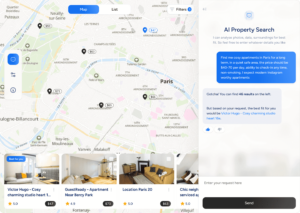
The real estate industry continues to evolve, particularly in the context of technological advancements. In 2024, the significance of keeping pace with technology is evident, with Artificial Intelligence emerging as one of the most crucial factors in reshaping real estate transactions.
The success of contemporary real estate is now closely tied to the integration of AI and similar technologies that will significantly enhance user experience and contribute to streamlined operations.
Our team has been actively involved in multiple real estate projects ranging from marketplace development to audit and consultancy. Throughout this process, I have continuously assessed numerous and versatile requests from our clients and monitored the evolving state of the real estate market. I am now excited to share key insights the Ascendix team has gained during our work.
In this article, I will explore essential pivotal AI features that I believe are going to define successful real estate marketplaces in 2024. Besides this, I will also mention what features might be considered non-essential, or nice-to-haves rather than crucial ones.
A successful marketplace is defined by its ability to provide users with the perfect property quickly and easily. The elaborate well-balanced system of filters is a must for a modern marketplace.
Except for traditional filtering criteria like location, price, property type, amenities, number of bedrooms, and bathrooms, commonly offered by rental platforms, AI can improve customer experience on marketplaces by implementing AI-personalization strategies, suggesting additional filters to provide the most relevant results, autocompleting the user’s query based on popular searches, and utilizing smart sorting of the properties found.
High-resolution property images and 3-D virtual tours have already become a standard feature of rental marketplaces, providing comprehensive property views online.
In 2024, AI will help these technologies move even further, providing a fully immersive and interactive customer experience. AI-powered image and video analysis technologies used on rental marketplaces mean a new level of property visualizations, offering potential buyers or tenants a fully realistic virtual tour in and outside of the property.
Computer vision algorithms, combined with the analytical capabilities of AI, can identify key features in property images, such as room dimensions, architectural styles, and amenities. This information is then used to create 3D models or virtual tours, allowing users to explore properties remotely with a high degree of detail.
This will be especially beneficial in situations where physical property visits are challenging or inconvenient.
AI-powered chatbots—which are trained either manually or by using available information about the properties—offer proactive 24/7 customer support, meaning enhanced customer experience and a higher chance of getting a sale. Chatbots can handle inquiries, offer property information, assist users in navigating through listings, and ensure immediate responses to user queries, even during off-hours.
Moreover, by utilizing natural language processing algorithms, the AI chatbots can engage in meaningful conversations, offering a more human-like interaction. AI chatbots free up agents' time and effort, which not only improves operational efficiency but also increases customer satisfaction and loyalty.
Unlike common filter search, natural language search can understand the conversational language of the user’s query, eliminating the need to scroll through filtering options in attempts to find a perfect property.

This search approach makes property searches more intuitive and user-friendly. By understanding and interpreting user queries in natural language, the chatbot can efficiently find properties that align with the user's specific requirements, such as location, budget, amenities, and preferences. This not only streamlines the search process but also offers more personalized and engaging interaction.
Combined with big data, AI has the power to increase the awareness of rental marketplace users about the property, neighborhood, and general market trends in the chosen location.
Information about the demand for the property, typical real estate prices in the area, neighborhood safety, market predictions, and the ability to compare and match the property options significantly contribute to informed decision-making, increase customer awareness, and improve marketplace experience.
AI algorithms can be utilized to analyze user behavior, preferences, and historical data, offering highly personalized property recommendations.
By understanding user preferences, AI can suggest properties that align with the individual's lifestyle, budget, and specific requirements. This enhances the user experience and increases the likelihood of successful transactions.
Real estate marketplaces can leverage AI to create personalized marketing campaigns, reaching potential clients with offerings that match their interests.
This targeted approach minimizes the time and effort required for users to find their ideal property, creating a more efficient and enjoyable real estate search experience.
Property viewing can become even more advanced and efficient with the help of AI Guides that would provide real-time information about the property, neighborhood, and nearby amenities.
This would eliminate the need to involve agents in the viewings, resulting in a convenient fully remote property viewing.
Unlike 3-D tours, Augmented Reality is more useful for renters who have chosen the property and are planning the renovation or a major change in the floor plan.

Integrating AR technology will allow potential renters to virtually estimate property scale and plan future home environments, providing a significant competitive advantage to a rental marketplace that would offer such an option.
AI applications can go beyond simple inquiry-handling in the form of 24/7 chatbots. They can analyze customer requests, improve user experiences by guiding customers through property listings, schedule property viewings, and potentially facilitate lease agreements by providing summaries and guidance on those, assisting in the initial stages of the buying or renting process.
Virtual assistants leverage Natural Language Processing to understand and respond to user inquiries in a conversational manner. They not only enhance user experience but also accelerate the customer journey by providing immediate and accurate information.
AI-powered tools can be used for generating digital lease agreements, which would streamline the paperwork process, making it much faster and more efficient for both landlords and tenants.
Although the documents would still need to be reviewed by a real estate professional, the process of renting would benefit from such an AI implementation.
The integration of AI in the real estate industry has already become a game-changer, and I am sure it will continue to reshape the industry even more in the upcoming year.
While AI implementation is not without its challenges, and it is essential to strike a balance between leveraging technology and maintaining a human touch, AI is bound to fully transform the way we approach real estate transactions, paving the way for a more efficient, user-friendly, and technologically advanced real estate marketplace.